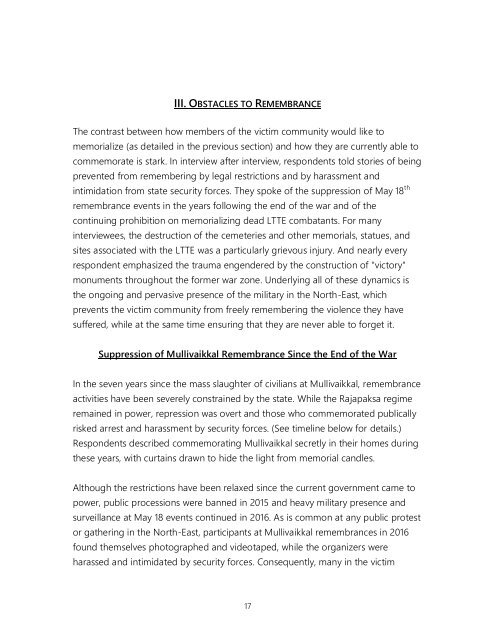7VqrhDjFg
7VqrhDjFg
7VqrhDjFg
You also want an ePaper? Increase the reach of your titles
YUMPU automatically turns print PDFs into web optimized ePapers that Google loves.
III. OBSTACLES TO REMEMBRANCE<br />
The contrast between how members of the victim community would like to<br />
memorialize (as detailed in the previous section) and how they are currently able to<br />
commemorate is stark. In interview after interview, respondents told stories of being<br />
prevented from remembering by legal restrictions and by harassment and<br />
intimidation from state security forces. They spoke of the suppression of May 18 th<br />
remembrance events in the years following the end of the war and of the<br />
continuing prohibition on memorializing dead LTTE combatants. For many<br />
interviewees, the destruction of the cemeteries and other memorials, statues, and<br />
sites associated with the LTTE was a particularly grievous injury. And nearly every<br />
respondent emphasized the trauma engendered by the construction of "victory"<br />
monuments throughout the former war zone. Underlying all of these dynamics is<br />
the ongoing and pervasive presence of the military in the North-East, which<br />
prevents the victim community from freely remembering the violence they have<br />
suffered, while at the same time ensuring that they are never able to forget it.<br />
Suppression of Mullivaikkal Remembrance Since the End of the War<br />
In the seven years since the mass slaughter of civilians at Mullivaikkal, remembrance<br />
activities have been severely constrained by the state. While the Rajapaksa regime<br />
remained in power, repression was overt and those who commemorated publically<br />
risked arrest and harassment by security forces. (See timeline below for details.)<br />
Respondents described commemorating Mullivaikkal secretly in their homes during<br />
these years, with curtains drawn to hide the light from memorial candles.<br />
Although the restrictions have been relaxed since the current government came to<br />
power, public processions were banned in 2015 and heavy military presence and<br />
surveillance at May 18 events continued in 2016. As is common at any public protest<br />
or gathering in the North-East, participants at Mullivaikkal remembrances in 2016<br />
found themselves photographed and videotaped, while the organizers were<br />
harassed and intimidated by security forces. Consequently, many in the victim<br />
17


